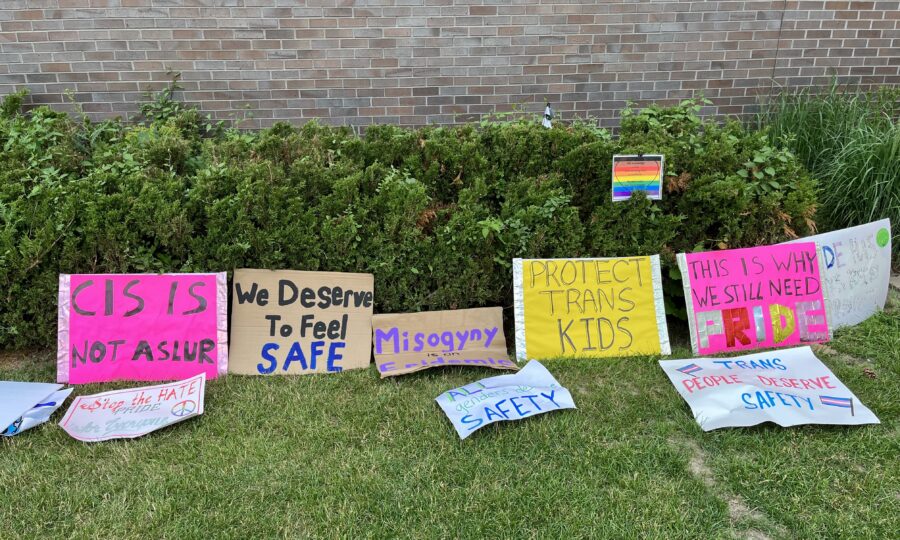This opinion piece appeared in the Globe and Mail on January 24. With permission, I am re-posting it here, the day the sentence decision will be issued.
You can listen to my January 28 interview on the CBC’s Morning Edition, or watch a video interview here. (I wasn’t warned there would be video! I had come straight from the gym! Hopefully there isn’t smoothie all over my face).
For further reading, see We Need to Talk About the Backlash–What is To Be Done?, a report prepared for the Canadian Philosophical Association, the Canadian Society Working for Inclusion in Philosophy, the Canadian Society for the History and Philosophy of Science, and the Federation for the Social Sciences and Humanities.
And of course, read Judith Butler’s Who’s Afraid of Gender. This episode of Bookends gives a good overview.
To understand why I was violently attacked, we have to see anti-gender ideology for the threat that it is
On June 28, 2023, a recent graduate of my workplace, the University of Waterloo, entered the classroom where I was teaching a philosophy of gender course. He attacked me and my students with two kitchen knives. I sustained stab wounds to my face and to my arm; two students also sustained physical injuries. The emotional impact of that day persists for me and the students, and it reaches beyond those of us who were in class that day. This was part of the offender’s expressed purpose: to send a message.
The offender pleaded guilty, with his sentence still to be determined.
One issue that was argued about during sentencing hearings in October was whether the offender had an ideological motive consistent with terrorist activity. Terrorist activity is defined under the Criminal Code as having a motivation “in whole or in part for a political, religious or ideological purpose, objective or cause.” The judge will now have to decide, within the constraints of the law, whether the attack was motivated by ideology.
But ideology is a sticky word. We use it as a synonym for a worldview or a set of beliefs, but it can mean many things. I was frustrated during the sentencing hearings because I felt that no one really understood how anti-gender ideology works in our world, and certainly not on the day of the attack that June.
The offender chose to target my class because it was scheduled at a convenient time. He chose kitchen knives because they were accessible (initially he desired a bow and arrow). He chose to target me, the professor, because I represented, for him, the “problem” of gender studies; in his view, allegedly, I was a figurehead for an area of study that is anti-science, pro-censorship, and pro-authoritarianism. In court, he said he believes post-secondary institutions are “forcing ideology” on people. Yet somehow he also said the attack was “nothing personal.” Although we were entirely unknown to each other “personally,” I still recognize his ideology – and I want everyone else to recognize it, too.
Ideology, as described by feminist scholar Judith Butler, is a binding force, not only for beliefs but also anxieties and fears. Anti-gender ideology is not a singular thing, but it exclaims that thinking about gender is something to fear. It then makes that fear the central lens through which a person understands how the world works. For whatever ails us, from economic insecurity to social instability, the blame can be laid entirely upon “gender.”
When fears and insecurities like the ones the offender admits to holding are expressed through anti-gender ideology, they can give a person a sense of control and belonging. From this perspective, it is not fear of a changing world but rather an awareness of gender and its role in our society that is to blame for those changes, and therefore it can and should be targeted. Anti-gender ideology claims that stability and flourishing are scarce resources, that life is already unfair and we should all have to “earn” our way to success without some people getting a “leg up” from, say, diversity and inclusion initiatives.
Of course, we know that protecting one person’s freedom does not mean that another person must then have less. Equity does not require taking away someone’s power and giving it to another. But it’s not enough to simply say these things out loud or write them down. Challenging anti-gender ideology cannot be achieved merely through good arguments because this subject inevitably involves our emotional responses. Anti-gender ideology is alluring to certain individuals because of its ability to acknowledge the anxieties produced by our uncertain times (even though the “belonging” it promotes is fleeting).
We need a common understanding of how ideologies are weaponized and how we as a society can respond to fears about economic and social insecurity. To overcome anti-gender ideology, including the violence it promotes and its erosion of policies that protect gender, race and sexuality-based equity, we need to create a different vision of the future, one that shows people that we can all, to paraphrase Prof. Butler, live and breathe freely, without committing violence.
I continue to think about how the attack was, as the offender emphasized, “nothing personal.” How can a new vision of the future be more than just words? How can it bring everyone into the fold, and end the insecurity?
I think it has to, in some sense, be personal. Even though I don’t know you personally, I know I have a role to play in building a world where we can both live and breathe freely. It’s only when each of us refuses to abandon others that we can all live and breathe in that freedom.
This work starts with understanding and recognizing fears. Working in coalition, we can create a society that replaces fear with hope.
